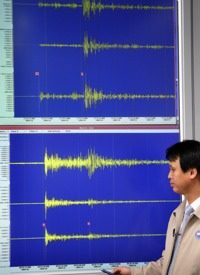
Regarding the nuclear test on Monday, the New York Times said on May 25: “The United States Geological Survey reported that Monday’s episode had a magnitude of 4.7, which would make it slightly larger than the one that the North Koreans generated in October 2006. Many experts considered that atomic blast a near flop, and they wondered the same about Monday’s test. ‘Was it another fizzle?’ asked Hans M. Kristensen, a nuclear expert at the Federation of American Scientists. ‘We’ll have to wait for more analysis of the seismic data, but so far the early news media reports about a “Hiroshima-size” nuclear explosion seem to be overblown.’ ”
Of course, the May 26 Times story noted, these tests “sharpened the confrontation between North Korea and much of the international community including the United States as the United Nations Security Council vowed to craft a resolution that could impose further sanctions on the increasingly isolated North.” Here is where The New American has been ahead of the curve in its analysis of the ongoing North Korean crises. In our April 6 story (“North Korea Missile Launch Creates Crisis”) about North Korea’s April 5 launch of a long-range rocket, we noted that “the casting of Kim Jong-il as a global threat whose actions must be countered … provides internationalists an argument for equipping the United Nations with the means to bring Kim Jong-il and all other tyrants either to the negotiating table or to ruin. That is to say, the real action in this crisis could actually be in the reaction.”
President Obama intends for the United States to be part of this reaction. Our April 5 article “Obama’s ‘World Without Nuclear Weapons’ ” pointed to his words spoken that same day in Prague: “North Korea must know that the path to security and respect will never come through threats and illegal weapons. And all nations must come together to build a stronger, global regime.” He went on to explain: “We should come together to turn efforts such as the Proliferation Security Initiative and the Global Initiative to Combat Nuclear Terrorism into durable international institutions,” and suggested that the United States should host “a Global Summit on Nuclear Security … within the next year.” Thus the president’s answer to the much-hyped threat of North Korea is to “build a stronger, global regime” by further strengthening international institutions at the expense of our own freedom and sovereignty.
On April 30, in “North Korean Threat Grossly Overblown,” we looked at just how much of a threat North Korea really poses to the United States. “North Korea has no ability to project conventional military force beyond its own sealed borders except into its South Korean neighbor.” While North Korea has proven capable of achieving nuclear explosions with test devices, that “is a far cry from producing reliable, deliverable nuclear weapons, especially warheads miniaturized sufficiently to be mounted in a missile cone.” And North Korea can only keep up its military might and nuclear aspirations while allowing its people to starve “because the West, including the United States, helps to keep the regime afloat with periodic infusions of cash and humanitarian aid.”
Voice of America News reported on April 30 that “the United States says it will not give North Korea further economic aid until Pyongyang returns to nuclear talks.” But Secretary of State Hillary Clinton “said the administration has requested funds for economic aid to North Korea in case Pyongyang returns to nuclear talks and re-starts disablement measures.” Granted, this was before the current crisis, but any offer of aid only encourages North Korea to keep stringing us along, milking us for everything they can get.
In the final analysis, the United States should not allow North Korea’s saber rattling to prompt any surrender of our independence to international institutions, but perhaps it should provoke us to draw our scissors and permanently cut the aid that only serves to prop up a communist dictatorship.
Photo: AP Images



